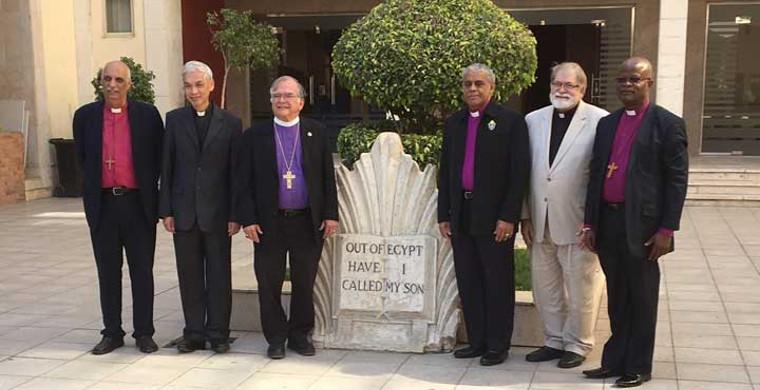Addressing The "Ecclesial Deficit" In The Anglican Communion
By The Rev. Canon Phil Ashey
https://www.americananglican.org/
October 12, 2018
How can we proclaim Christ faithfully to the nations when the very foundations of that Gospel proclamation are being undermined by Anglican leaders and Churches--at the highest levels of leadership-- throughout the largely Global North Anglican Communion?
The unilateral actions of the Diocese of New Westminster (Canada) in 2002 authorizing rites for the blessing of same-sex unions, and of the Episcopal Church USA in 2003 consecrating as a bishop a man in a same sex-relationship, in flagrant disregard of Lambeth Resolution I.10 (1998) and the pleas of the Primates of the Anglican Communion not to take such actions produced exactly what the Primates predicted--"tearing the fabric of Communion at its deepest level." (2003 Primates Meeting). The subsequent failure of the four Instruments of the Anglican Communion (The Archbishop of Canterbury, the Lambeth Conference of Bishops, the Anglican Consultative Council and the Primates Meetings) to take binding, ecclesiastical action against those who breached the boundaries of historic Anglican faith, order and practice revealed an "ecclesial deficit" within the structures of the Global Anglican Communion--a deficit in both authoritative teaching and the discipline to back up such teaching. In its 2008 Report to the Anglican Consultative Council, the Windsor Continuation Group identified this "ecclesial deficit" as:
"the inability to uphold structures which can make decisions which carry force in the life of the Churches of the Communion...the questions of the limits of diversity [which] becomes acute when major differences arise in the life of the communion of the Churches which concern the faith, order or moral life of the Communion. It is then that Anglicans need a common understanding of how together, in communion, they can, guided by the Spirit, discern and decide together." (Windsor Continuation Group Report 2008 at 51, 53).
Since then, the ecclesial deficit has only worsened because of false teaching and practices by Anglican Churches in Canada, Scotland, Wales and New Zealand redefining marriage and permitting various blessings of same sex unions and even marriage. There also appears to be intractable divisions on the issue of same-sex relationships within the Church of England's dioceses and General Synod. This raises concerns whether the "Mother Church" of the Anglican Communion and its bishops will be able to uphold the primacy and authority of Holy Scripture as captured in its historic Anglican formularies. If the "Mother" Church of England departs from the historic, Biblical teaching of the Church on marriage and sexual ethics, what then will it mean to be "Anglican"?
Will Anglicans be defined by a relationship--recognition by and relationship with the See of Canterbury (Lambeth Resolution 49 (1930))? Or, will Anglicans define themselves by what they believe: in the Biblical doctrine captured in the historic, Reformation Anglican formularies of the Thirty-nine Articles of Religion, the Book of Common Prayer 1662 and its Ordinal? Anticipating this choice as early as 2005, the Church of Nigeria changed its constitution to define membership in the Anglican Communion on the basis of shared doctrine and the confession of the faith "once delivered to the saints" (Jude 3), rather than by relationship with Canterbury.
Anglican followers of Jesus Christ in the Global South and the Global Anglican Future Conference (GAFCON) are unwilling to be defined by the aggressive secularism that, largely, dominates the Western Church. In their October 2016 Communique from the Sixth Global South Conference, delegates from 16 Provinces (including GAFCON Provinces and the partner province of the Anglican Church in North America), concluded:
"The present and potentially escalating crisis poses challenges to the Global South in the shepherding of her people. We recognise the need for our enhanced ecclesial responsibility. We need to strengthen our doctrinal teaching, our ecclesiastical ordering of our collective life as a global fellowship and the flourishing of our gifts in the one another-ness of our mission.
"The Global South Primates will therefore form a task force to recommend how these needs can be effectively addressed." (The Sixth Trumpet, October 2016 Communique, paras. 30, 31)
Over the last 18 months, this task force, appointed by the leadership of the Global South, (including the leadership of GAFCON) worked on a report that was delivered to the Global South Primates meeting in Cairo October 10. The report was titled "Enhancing Ecclesial Responsibility of Global South Churches" and focused on "our ecclesial ordering of our collective life as a global fellowship and the flourishing of our gifts in the one-anotherness of our mission."
It has been one of the greatest privileges and blessings in my life to have served on this Task Force with such wonderful leaders and brothers in Christ. The Global South Primates have received the Report. Please pray for the Primates and the Task Force, for Holy Spirit inspired grace, wisdom and guidance for the next steps.
(Pictured above, the Task Force on Enhancing Ecclesial Responsibility. L-R. Bishop Samy Shehati (N Africa), Canon Michael Poon (Singapore), Archbishop emeritus Robert Duncan (N America), Bishop Rennis Ponniah (Singapore), Canon Phil Ashey (N America) and Bishop David Onuoha (Nigeria)
The Rev. Canon Phil Ashey is President & CEO of the American Anglican Council.














